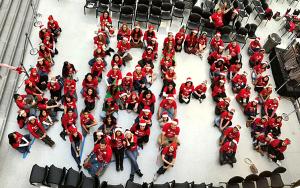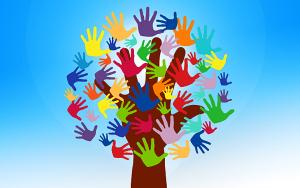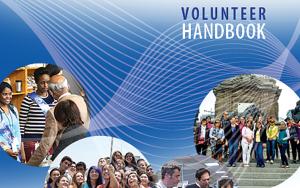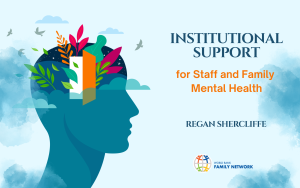Moving to Washington DC with the World Bank Group? Whether you are planning your move to DC, have just arrived or have been in the US for years, here is some important practical information to help guide you through the relocation process as a WBG spouse/partner. For detailed information, read our Welcoming Handbook, attend our information seminars and welcoming events posted on our Activities page. Join our WBF Buddy Whatsapp Group for Newcomers to DC for practical information, tips and support in real time, anytime. Send an email to wbfnwelcoming@worldbank.org
Support—Headquarters—Personal Banking
The banking system in the US can differ greatly from systems in other countries, and it is important to understand certain terminology and concepts in order to navigate it effectively. Most WBG staff open an account at Bank-Fund Staff Federal Credit Union (BFSFCU), which conveniently has branches in the Bank’s Main Complex building and the IFC building.
BFSFCU was formed by employees of the World Bank and the International Monetary Fund (IMF) in 1947 to give their colleagues a convenient place to save and borrow with better-than-market rates. Today, BFSFCU offers the same products and services you would find at most banks. They have the added expertise to work with members who have little or no U.S. credit history to find a product that best meets their needs.
The following sections will guide you through opening an account, the use of credit and debit cards in the US, and some key safety tips.
Banks and credit unions provide a variety of services, including checking and savings accounts, ATMs, online banking and billpayer, and loans. Funds deposited in US banks are protected by the Federal Deposit Insurance Corporation (FDIC), which insures up to $100,000 per account. Money deposited in credit unions is protected through the National Credit Union Administration, which is backed by the US Government. Regular credit union accounts are insured up to a maximum of $250,000 per account.
Either partner in a joint account has the right to withdraw funds or close the account without the approval or knowledge of the other account holder. Either party may obtain a court order to freeze the account. Banks and credit unions usually offer several different types of checking accounts.
BFSFCU offers a basic checking account with no minimum balances, no monthly fees and unlimited check-writing. BFSFCU also offers tiered interest-bearing Money-Management Accounts for amounts greater than $2,500. (see www.BFSFCU.org/rates for current rates).
Other examples are:
- Regular checking accounts allow you to write an unlimited number of checks each month. These accounts do not generally pay interest, and a small monthly fee may be charged if the balance in the account falls below a minimum level
- Interest-bearing checking accounts provide free unlimited checking and pay a low rate of interest to customers who keep a higher minimum balance in their accounts
- Money market accounts pay a higher rate of interest than interest-bearing checking accounts but allow you to write only a small number of checks a month (perhaps three to five) and require that a higher minimum balance (often $2,500) be maintained at all times. Most money market accounts also require that checks be written only for amounts over a certain minimum (perhaps $500). Although money market accounts are offered by banks, they are managed by stock brokerage firms and are not federally insured (although some are privately insured)
What you should know about your checking and money market accounts:
- Name and location of your bank or credit union branch (or branches)
- Account numbers of all accounts
- Monthly fee and service fees charged by your bank or credit union
- Amount of overdraft protection you have
- Telephone number to call if checks are lost or stolen
- Minimum balance required in checking and money market accounts
- Minimum amount of checks that can be written on money market account
- Maximum number of checks that can be written on money market account
WBG staff have their paychecks deposited into their checking accounts. The amount of the direct deposit shows up on the monthly account statement, which shows all account activity: deposits, withdrawals, and checks written. Some banks return checks cashed against your account each month. These records serve as proof of payment and should be retained, along with your monthly checking account statements, for at least seven years. BFSFCU members can find copies of canceled checks electronically at no charge through Online Banking, or for a nominal fee upon request.
Bank-Fund Staff Federal Credit Union (BFSFCU) serves the banking needs of staff, retirees and families of the WBG and the IMF. Spouses are encouraged to establish accounts at the BFSFCU in their own names. Joining is free. Members have access to a full range of low- or no-cost services, from credit cards, checking and savings accounts, to car and real estate loans. BFSFCU has three full-service branches: World Bank Main Complex C2-300, the IFC, and IMF HQ2. You can also find them online at www.BFSFCU.org.
Most US banks are open between 9:00am and 3:00pm, Monday through Friday, although drive-thru service windows may open earlier or stay open later. Automated Teller Machines (ATMs) can be accessed 24-hours-a-day with an ATM card issued by the financial institution where you have an account. Some banks are also open later on certain days and on Saturday mornings. Most banks are closed on Sundays and on holidays.
Banks and credit unions sometimes provide account holders with ATM cards, which are plastic cards that allow you to deposit and withdraw money and check your balance at ATM machines throughout the world. Transactions made at ATMs located at your institution's branches, or owned by your institution, are usually free. An ATM surcharge fee of $2.00-$3.00 is often charged for using a machine that is not owned by your bank. To protect customers against theft from their accounts, many banks allow customers to withdraw only a few hundred dollars within a 24-hour period through ATMs.
When you open a checking account, most institutions will give you both an ATM debit card with a personal identification number (PIN). The ATM debit card operates like a hybrid: you can use the debit card like cash or a personal check for purchases and, of course, for use at ATMs. The BFSFCU debit card has the Visa logo on it, so you can use it wherever the Visa is accepted with either your PIN or your signature. If you use your PIN, it will "feel" like your ATM card; if you use it with your signature, it will "feel" like your credit card. It's different from your credit cards because the money is deducted straight from your checking account. Debit cards allow you to spend only what is in your account. It is a quick transaction between the merchant and your account.
To use an ATM, you must have your card and know your PIN. To protect yourself against theft, do not write your number down on the card or disclose your PIN to anyone. It is wise to write it and store it somewhere away from the card. Memorize the four-or five-digit number. If your ATM card is lost or stolen, immediately contact your card issuer, which will cancel the card and issue you a new one. At BFSFCU, an ATM card plus a PIN enables you to withdraw cash via ATMs, make account balance inquiries, deposit money (basically at BFSFCU ATMs only) and, depending on the machine, transfer between accounts. Never, ever give out your PIN.
Using an ATM card for cash withdrawals overseas typically would be advantageous, because one thereby avoids expensive exchange fees. Visit the www.BFSFCU.org/ATM to find out more about avoiding surcharges on ATM withdrawals abroad.
What you should know about your ATM card:
- Your Personal Identification Number (PIN)
- Telephone number to call if your card is lost or stolen
- Location of your bank or credit union's ATMs and ATM networks
- Fees charged for using the ATM card
- Daily limits that apply to transactions
- How to get fees waived
Finally, at all 7-Eleven stores BFSFCU account holders’ ATM fees are waived!!
The Credit Union offers an excellent array of Visa credit cards, including an advantageous Member Rewards and Cash Rewards program. Also, all BFSFCU Visa Platinum credit cards are now equipped with chip technology, to help ensure a more secure transaction. Visit www.BFSFCU.org/creditcards for full of details about these programs, and how to apply.
An application for a credit card may be completed in person at a bank branch, over the phone, or online. In reviewing your application, the card issuer will check that you have adequate income and an acceptable credit rating. If you have failed to pay your bills in the past, you may have a credit rating that will prevent you from obtaining a credit card. Sometimes a poor credit rating may be caused by an error, which can be corrected if identified. If you are denied credit or would like to see your credit reports for any reason, contact one of the following credit rating services. Your reports are available once each year free.
- Experian, 1-888-397-3742, www.experian.com
- Equifax, 1-800-685-1111, www.equifax.com
- Trans Union, 1-800-888-4213, www.transunion.com
It is recommended that you request your credit reports annually to make sure that your credit remains in good standing, and that there are no errors. Based on your income and credit history, the card issuer will set a credit limit on your credit card. This limit indicates the amount that you can charge each month before having to make a payment. If you believe that your credit limit is too low, you may ask the institution to consider raising your credit limit.
Spouses without incomes can apply for a "secured" credit card. An amount of money is deposited with the lending institution, and a credit card with a limit in the amount of the money deposited is issued. By using a secured credit card for about a year, purchasing and paying the complete balance in a timely manner, spouses with Social Security numbers can establish a credit history in their own names.
Credit card fraud is a serious problem throughout the world. By stealing credit cards or obtaining other peoples' credit card numbers, unauthorized users can obtain merchandise without paying for it. It is important to record all your credit card numbers and keep the numbers in a safe place. To protect yourself against credit card fraud, be sure to save your credit card receipts so that the credit card number cannot be picked up by an unauthorized user. Check your bill carefully each month to make sure that all of the charges that appear on the bill were made by you or another authorized user. If you notice purchases you cannot identify or your credit card is lost or stolen, immediately contact your financial institution. Your card will be canceled and a new card will be issued. Be sure to read your credit card agreement carefully to determine your responsibility in the event that fraudulent purchases are made.
What you should know about your credit and debit cards:
- Names and phone numbers of your credit and debit card banks
- Account numbers of all credit and debit cards
- Telephone number to call if your card is lost or stolen
- Interest rates and annual fees charged on all credit cards
- Credit limit on all credit cards
- Date payment is due on all credit cards
- Minimum payment required
- Liability if your card is lost or stolen
Most people in the US borrow money from financial institutions at one time or another. Loans may be used to purchase homes and new or used vehicles, to finance college education or the remodeling of a house, and to pay off other debts. To apply for a loan, you or your spouse must fill out an application from your financial institution. The application will ask about your income, place of employment, place of residence, accounts, credit cards, and other loans, and you will be asked to provide proof of employment and residence (in the form of a pay stub, a lease, or a mortgage statement). A bank or credit union officer will evaluate your application and determine whether your financial situation will allow you to repay the principal and interest on the loan.
To be able to borrow money, it is vital to establish a credit history. This can be done by applying for a credit card, using it to make purchases, and paying your bill promptly. It is recommended that spouses establish credit cards in their own names and accounts containing cash for times of emergency.
Once a year photocopy the entire contents of your wallet. Keep the copies in a safe place. Should you lose your purse or any credit card, you will have the information available. Unused checks should be kept in a safe place, and checks should never be signed before they are made out to a person or company, since a signed check can be cashed by anyone who finds it. If your checks are lost or stolen, contact your financial institution immediately.
Savings accounts pay interest but have limited or no writing privileges. Interest rates vary from institution to institution and can change at any time. Because savings accounts pay low interest rates, most people do not keep large sums of money in such accounts. Certificates of deposit, called “Share Certificate Accounts” at credit unions, pay higher rates of interest but charge penalties for withdrawing funds early. Certificates of deposit usually require a $500-$1,000 minimum and can be purchased for maturities of 30 days to 5 years. Higher rates are usually paid on longer maturities and larger certificates.
What you should know about your savings accounts and certificates of deposit:
- Name and location of your bank or credit union branch (or branches)
- Account numbers of all savings accounts
- Account numbers and maturity dates of all certificates of deposit
- Interest rates paid on your accounts, and
- Penalties for early withdrawal of funds






